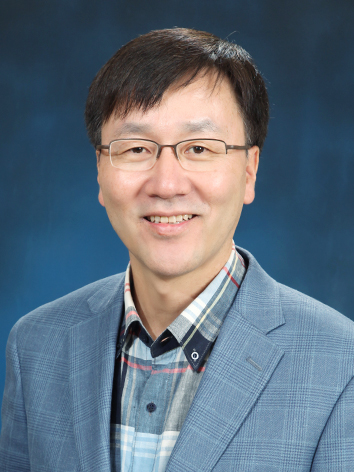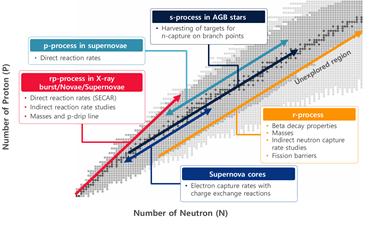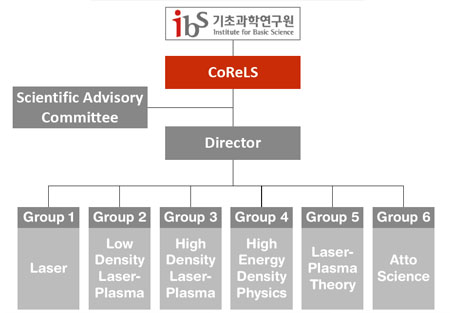주메뉴
- About IBS 연구원소개
-
Research Centers
연구단소개
- Research Outcomes
- Mathematics
- Physics
- Center for Underground Physics
- Center for Theoretical Physics of the Universe (Particle Theory and Cosmology Group)
- Center for Theoretical Physics of the Universe (Cosmology, Gravity and Astroparticle Physics Group)
- Dark Matter Axion Group
- Center for Artificial Low Dimensional Electronic Systems
- Center for Quantum Nanoscience
- Center for Exotic Nuclear Studies
- Center for Van der Waals Quantum Solids
- Center for Relativistic Laser Science
- Chemistry
- Life Sciences
- Earth Science
- Interdisciplinary
- Center for Neuroscience Imaging Research (Neuro Technology Group)
- Center for Neuroscience Imaging Research (Cognitive and Computational Neuroscience Group)
- Center for Algorithmic and Robotized Synthesis
- Center for Nanomedicine
- Center for Biomolecular and Cellular Structure
- Center for 2D Quantum Heterostructures
- Institutes
- Korea Virus Research Institute
- News Center 뉴스 센터
- Career 인재초빙
- Living in Korea IBS School-UST
- IBS School 윤리경영


주메뉴
- About IBS
-
Research Centers
- Research Outcomes
- Mathematics
- Physics
- Center for Underground Physics
- Center for Theoretical Physics of the Universe (Particle Theory and Cosmology Group)
- Center for Theoretical Physics of the Universe (Cosmology, Gravity and Astroparticle Physics Group)
- Dark Matter Axion Group
- Center for Artificial Low Dimensional Electronic Systems
- Center for Quantum Nanoscience
- Center for Exotic Nuclear Studies
- Center for Van der Waals Quantum Solids
- Center for Relativistic Laser Science
- Chemistry
- Life Sciences
- Earth Science
- Interdisciplinary
- Center for Neuroscience Imaging Research (Neuro Technology Group)
- Center for Neuroscience Imaging Research (Cognitive and Computational Neuroscience Group)
- Center for Algorithmic and Robotized Synthesis
- Center for Nanomedicine
- Center for Biomolecular and Cellular Structure
- Center for 2D Quantum Heterostructures
- Institutes
- Korea Virus Research Institute
- News Center
- Career
- Living in Korea
- IBS School
Research Centers
- Research Outcomes
- Mathematics
- Physics
- Center for Underground Physics
- Center for Theoretical Physics of the Universe (Particle Theory and Cosmology Group)
- Center for Theoretical Physics of the Universe (Cosmology, Gravity and Astroparticle Physics Group)
- Dark Matter Axion Group
- Center for Artificial Low Dimensional Electronic Systems
- Center for Quantum Nanoscience
- Center for Exotic Nuclear Studies
- Center for Van der Waals Quantum Solids
- Center for Relativistic Laser Science
- Chemistry
- Life Sciences
- Earth Science
- Interdisciplinary
- Center for Neuroscience Imaging Research (Neuro Technology Group)
- Center for Neuroscience Imaging Research (Cognitive and Computational Neuroscience Group)
- Center for Algorithmic and Robotized Synthesis
- Center for Nanomedicine
- Center for Biomolecular and Cellular Structure
- Center for 2D Quantum Heterostructures
- Institutes
- Korea Virus Research Institute
Study of the fundamental properties of exotic nuclei and the origin of heavy elements in the Universe
Tel. +82-42-878-8232
IBS Center for Exotic Nuclear Studies,
Room C327, 55 Expo-ro, Doryong-dong,
Yuseong-gu, Daejeon (34126), South Korea
Major Publications
- - Creation of quark-gluon plasma droplets with three distinct geometries C. Aidala et al., Nature Physics 15, 214 (2019)
- - Quasi neutron knockout from 54Ca corroborate arising N=34 neutron magic number S. Chen et al., Physical Review Letters 123, 142501 (2019)
- - Measurement of the 14O(a,p)17F cross section at Ec.m. = 2.1-5.3 MeV A. Kim et al., Physical Review C 92, 035801 (2015)
Director

Director Kevin Insik Hahn
Director Hahn is a world-renowned expert in the field of nuclear physics and nuclear astrophysics by utilizing rare isotope accelerators. Experimental nuclear astrophysics is to study key nuclear reactions that are responsible for generating heavy elements and explosive energy in stars such as the sun and supernovae. Hahn introduced the field of experimental nuclear astrophysics to the nuclear physics community in Korea and contributed greatly to the advancement of nuclear astrophysics research in Korea.
Previous to coming to IBS, he carried out many important experiments at the world's leading research institutes, such as Yale University, Caltech, Brookhaven National Laboratory, and RIKEN (Japan). For the past 20 years, he has worked in experimental nuclear physics as a faculty member at Ewha Womans University. He conducted in particular important experiments related to the breakup reactions from the HCNO cycle to the rp-process in explosive stellar sites such as novae and X-ray bursts. Recently, an interesting result of discovering a new magic number for neutron-rich isotopes was published from an international collaboration. As a part of a joint PHENIX international collaboration, the world's first suggestion that the quark-gluon plasma may exist in small systems was published in the journal “Nature Physics”.
Introduction

The Center for Exotic Nuclear Studies (CENS) is composed of 4 groups: experimental nuclear astrophysics, experimental nuclear structure, experimental nuclear reaction and theoretical nuclear physics. The Center currenlty conducts various experiments on exotic nuclei using rare isotope (RI) beams from overseas RI accelerators. In the near future, the Center will also utilize RAON, which is a state-of-the-art rare isotope accelerator that is being built in the Sindong area in Daejeon and which will be completed in 2021. CENS is expected to be the cornerstone of exotic nuclear physics research in Korea and to play a leading role in global research. In particular, experiments and theoretical studies on exotic nuclei will be conducted, including on basic properties of short-lived nuclei, the identification of the origin of cosmic elements, and the discovery of new rare isotopes.
- - Understanding the origin and synthesis of heavy elements produced in explosive stellar events such as nova and X-ray bursts by using accelerators.
- - Producing exotic nuclei far from the stability line and investigating the nuclear structure by using accelerators.
- - Experimental and theoretical studies of nuclear reactions and structures of exotic nuclei
Main research activities
The synthesis of heavy elements in the universe as well as fundamental interactions among constituents of nuclei are not fully understood to date. Heavy elements from iron to uranium are expected to be produced by the rapid neutron capture process (r-process) in explosive stellar events such as supernovae or neutron star mergers. The Center for Exotic Nuclear Studies (CENS) aims to understand the structures and reactions of exotic nuclei. The Center also plans to perform nuclear astrophysics experiments on astrophysically important reactions related to various nucleosynthetic processes in order to enhance our understanding of the origin of heavy elements and the mechanism of explosive stellar events.
To conduct research properly, it is necessary to bombard heavy-ion beams onto a target to generate exotic nuclei and to understand the properties of the elements. Therefore, CENS plans to perform experiments on astrophysically important nuclear reactions such as proton/neutron capture processes using rare isotope (RI) accelerators and conduct nuclear structure studies in areas such proton/neutron drip lines, new magic numbers, and island inversions.
In order to be internationally competitive, particle and gamma-ray detectors such as silicon detectors, germanium detectors, and plastic scintillators will be constructed in arrays to detect signals emitted from exotic nuclei for the research of nuclear properties and reactions. In addition, we plan to conduct important experiments using accelerators with the goal of contributing significantly to nuclear physics research in the world.
Organization

Main research results
- 1.5 PW Laser Beamline 4PW improves performance - Extreme laser field attainmnet
(Optics Express, 2019) - Propose a powerful gamma-ray generation mechanism by non-linear compton scattering at targets with critical and solid densities
(New. J Phys, 2019) - Discovery of polarized radiation generated by a violent field phenomenon
(Nature Photonics, 2018) - Development of OPCPA amplifier; changeable spectrum
(Optics Express, 2018) - Resolving Multiple Molcular Orbitals Using Two-Dimensional High-Harmonic Spectroscopy
(Physical Review Letters , 2015) - Transition of Proton Energy Scaling Using an Ultrathin Target Irradiated by Linearly Polarized Femtosecond Laser Pulses
(Physical Review Letters, 2013) - Enhancement of Electron Energy to the Multi-Gev Regime by a Dual-Stage Laser-Wakefield Accelerator Pumped by Petawatt Laser
(Physical Review Letters, 2013)
Personnel
| Total | 71 |
|---|---|
| Gender | 64(Male), 7(Female) |
| Korean/ International | 64(Korean), 7(International) |
Degree
Position
As of October. 2019











